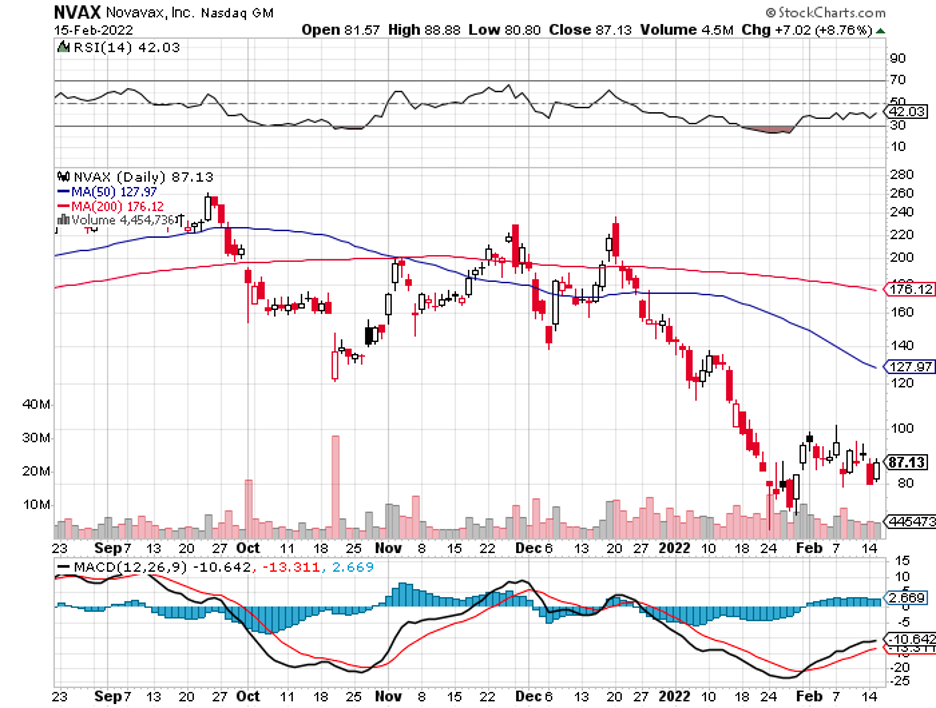Is This The Solution To The Anti-Vaxxers?
One of my old friends, a 45-year-old teacher, has long held the belief that getting vaccinated against COVID-19 is a terrible idea.
Despite the growing number of people getting jabbed, he still felt uneasy over the new mRNA technology applied in the two most widely used shots, Moderna (MRNA) and Pfizer (PFE) / BioNTech (BNTX).
His anxiety worsened when his neighbor was sent to the hospital following his second shot, especially after the doctors said that the official cause of the heart muscle inflammation was the vaccine.
No amount of convincing could change his mind regardless of how many times I explained that the condition was a rare and relatively mild side effect.
However, things seemed to have changed when he heard about the Novavax (NVAX) vaccine, Nuxavoxid.
Since Nuxavoxid uses a decades-long pre-existing protein-based platform instead of a novel approach, more and more people like my friend are starting to take interest and considering signing up for the vaccine.
Actually, this reaction can be observed not only in the US but also across the globe. Data suggest that previously wary individuals now feel more confident over a more established technology.
Novavax’s vaccine uses a recombinant protein technology, which has been around since the mid-1980s.
In fact, this has become the go-to or standard platform used in developing vaccines against Hepatitis B, cervical cancer, and even meningitis.
What does this mean for Novavax?
Considering that over half of the global population has already been inoculated, it’s safe to say that Novavax is late to the party.
However, recent reports showed that a fourth vaccine does not show any significant antibody increase. This isn’t particularly promising especially in light of the Omicron variant.
Moreover, the EMA warned that "repeat boosters every four months might actually weaken people's immune systems. Boosters can be done once, or maybe twice, but it's not something that we can think should be repeated constantly.”
This can be good news for the newcomer Novavax.
Since Novavax uses a recombinant nanoparticle technology, this approach might be considered more effective as a booster shot instead of using the same mRNA technology for a fourth jab.
So far, this is presumed as one of the major reasons for Israel’s—one of the leading countries in vaccine administration—decision to place an order for an alternative COVID-19 vaccine last January.
Instead of reordering from Pfizer or Moderna, Israel opted to get 5 million doses, with an option to add 5 million more, of Novavax vaccine to serve as the fourth booster for its population.
Given that Israel is ordering for its 9.4 million citizens, this deal would serve as an excellent source of real-life data for Novavax’s candidate and whether it can become the go-to choice for booster shots across the globe.
Before this development, Novavax’s projected 2022 revenue was at $4.94 billion. However, the recent regulatory approvals from various nations and advanced orders have the company adjusting this projection.
Needless to say, the possibility of Nuxavoxid practically monopolizing the booster shot market has dramatically bolstered expectations.
On top of these, Novavax has been simultaneously working on a flu vaccine, Nanoflu, that can rival Sanofi’s (SNY) FluZone.
Given that the market size for influenza is expected to grow from $6.5 billion in 2022 to $10.73 billion by 2028, and the fact that Nanoflu easily outperformed the leading product by 40% in clinical trials, it’s safe to say that this is yet another promising revenue stream for Novavax.
Overall, I think Novavax is a good long-term play. It’s important to remember, though, that Novavax’s profile is very close to Moderna and BioNTech.
That means investors interested in this stock must have boundless patience and a strong stomach for the volatility in the following months.
Looking at its excellent potential, it’s clear that the stock is undervalued. Hence, it would be wise for interested investors to buy the dip.


